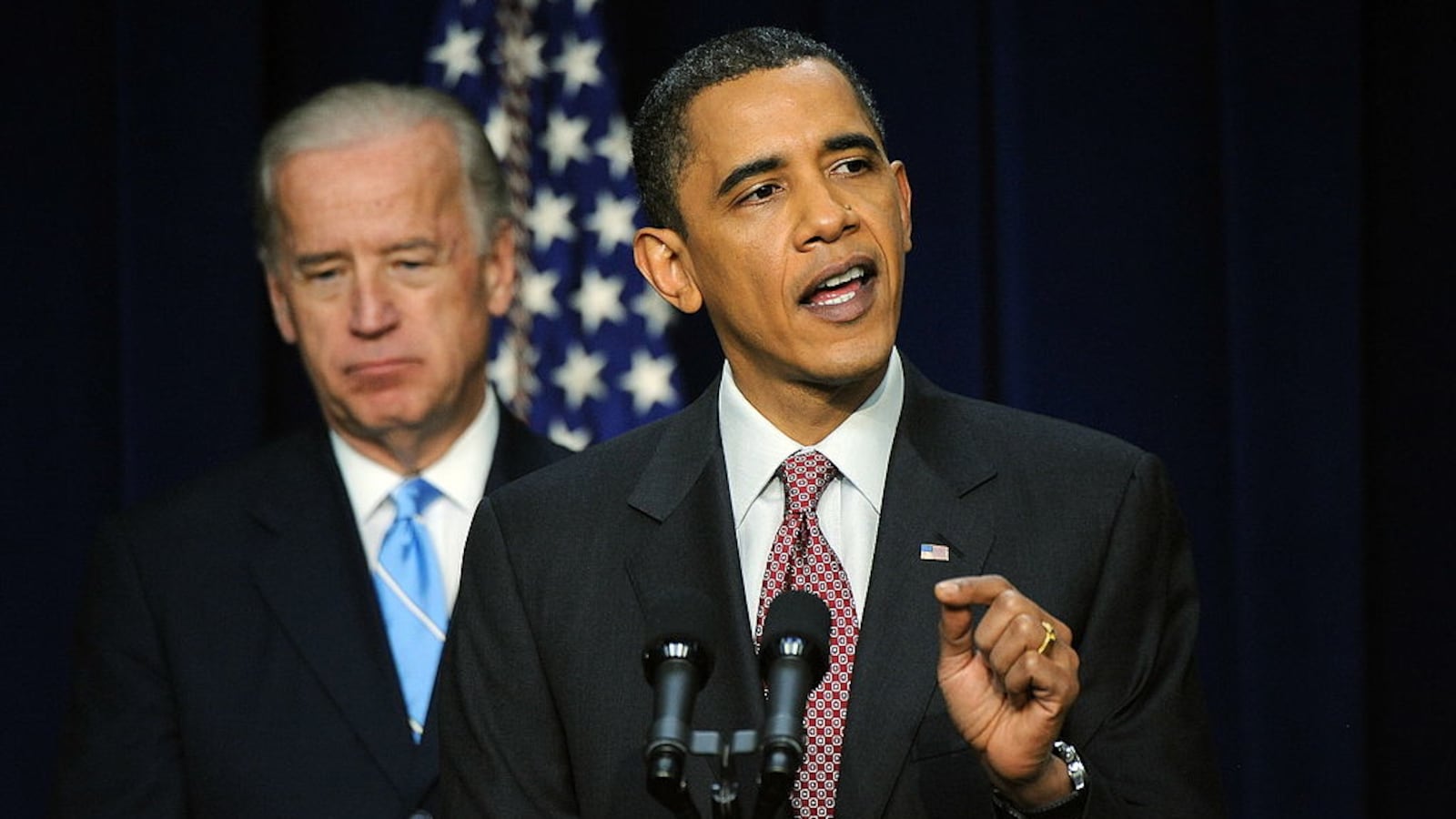If he loses to Donald Trump in November, President Joe Biden will see much of his legacy—on green energy, social justice, international leadership—vanquished by an administration determined to move the country sharply rightward. But his onetime boss, Barack Obama, will also see his own right years in office cast in a different light: democracy’s last gasp, as opposed to democracy’s renewal.
That may explain why Obama is reportedly working with Democrats who think the longer Biden stays in the race, the harder it will be to defeat Trump. Obama reportedly has been “in touch” with George Clooney, whose incendiary New York Times op-ed called on Biden to leave the presidential race. “While Obama did not encourage or advise Clooney to say what he said, he also didn’t object to it,” Politico reported on Thursday.
If accurate, that development stands in sharp contrast to what Obama said after Biden’s disastrous performance in last month’s presidential debate. “Bad debate nights happen,” Obama wrote on X about the man who served as his vice president for eight years. The rest of the message made clear that Obama believed Biden deserved eight years in the Oval Office of his own.
Contradiction and strife have long governed how the two men see each other. Their differences today are enormously consequential. But they are hardly new.
Biden’s campaign did not respond to a request for comment.
Obama was in his third year as the junior Senator from Illinois when he announced he was running for president in 2007. By then, Biden was already a three-decade mainstay of the upper chamber. His first run for the presidency, in 1988, had been shattered by accusations of plagiarism. Now he was running again.
Biden’s campaign began poorly, with an assessment of Obama that seemed to verge on racism, when he referred to Obama as the “first mainstream African-American who is articulate and bright and clean and a nice-looking guy.”
“I mean, that's a storybook, man," he said. The inevitable apology came quickly. Biden was still Biden, loquacious and undisciplined, ambitious but lacking gravitas. He dropped out after a dispiriting show in the Iowa caucuses.
Yet when it came time for Obama to select a vice president several months later, Biden seemed like the perfect choice. Obama was young and Black; Biden was old and white. Obama had gone to Ivy League schools; Biden was Scranton Joe.
As the journalists Mark Halperin and John Heilemann would reveal in their bestseller “Game Change,” a compulsively gossipy book about the 2008 presidential campaign, “a chill set in” between Obama and Biden after the much older Senator mused, with his characteristic lack of discretion, that he was the superior political talent (Biden has made a similar assessment of his own vice president, Kamala Harris). “Joe and Obama barely spoke by phone, rarely campaigned together,” according to Halperin and Heilemann.
Like every vice president, Biden had his portfolio. And like every vice president, he chaffed at the limitations of his office. Obama had his own advisers, many of them (Valerie Jarrett, David Axelrod) from his days in Chicago. He had his own ideas about how to handle Congress, too.
There were cultural differences, as well. Washington became hip thanks to the Obamas. Mick Jagger played at the White House. Hollywood actors came to work for the administration. The city exploded with new restaurants, and journalists obsessively chronicled the ones Obama and First Lady Michelle patronized. Tellingly, Biden was almost never invited to the White House residence. He and Jill lived on the margins.
When it came time for Democrats to choose their 2016 nominee, Obama went with the Beltway wisdom: Hillary Clinton. Biden’s son Beau had died form brain cancer in 2015, and Biden was grieving as he was trying to decide whether to run. Obama persuaded him against it. “The president was not encouraging,” Biden would later say.
During the Trump years, Obama mostly stayed out of politics. He made a podcast with Bruce Springsteen. He signed a development deal with Netflix. And he often left Democrats wondering why he didn’t speak more often, more strongly.
Then, in the first two years of the Biden administration, Obama watched as his oft-bumbling former understudy racked up wins that were garnering comparison to FDR and LBJ. Obama had his “Big Fucking Deal” (as Biden famously called the Affordable Care Act in a hot mic moment). Obama had billions in infrastructure and green energy investment, lower drug prices, the CHIPs Act and, at least during the early stages of the war in Ukraine, the kind of world leadership Obama never achieved.
“President Biden is being hailed as a transformational, once-in-a-generation progressive champion,” Maureen Dowd of the New York Times wrote, “while Obama has become a cautionary tale about what happens when Democrats get the keys to the car but don’t put their foot on the gas.”
Now, with Trump ascendant once again, Obama and Biden have complex calculations to make. If Biden survives calls to step down and prevails over Trump in November, he will once again have proved wrong all the smart people in Washington and New York. But if he loses, he could be blamed for setting the nation on a path to authoritarianism.
If, in the next several weeks, Obama manages to convince Biden to step down, and if his successor manages to win the presidency, the former president will almost certainly be seen as the Democratic Party’s---and perhaps democracy’s---quiet savior. But that path, if he chooses it, is a fraught one, paved with layers of bitter feeling that have hardened over the years.






